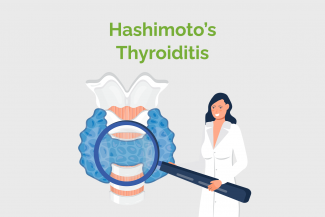Hashimoto’s thyroiditis, also called Hashimoto’s disease, is an autoimmune disease in which the thyroid is attacked by the body’s immune system, causing symptoms of hypothyroidism (underactive thyroid gland). It is most common among middle-aged women.

Other associated diseases
Patients with Hashimoto’s thyroiditis and their genetically connected relations are at increased risk of developing the following disorders:
- Type 1 Diabetes Mellitus (insulin-requiring)
- Graves’ disease (goiter and hyperthyroidism or overactive thyroid)
- Rheumatoid arthritis
- Pernicious anaemia (inability to absorb vitamin B12, potentially causing anaemia and neurologic problems)
- Addison’s disease (adrenal failure; the adrenal gland provides cortisol to handle stress and illness)
- Premature ovarian failure (early menopause)
- Vitiligo (patchy loss of skin pigmentation)
- Thrombocytopenic purpura (bleeding disorder due to inadequate platelets in the blood)
- Lupus erythematosus (autoimmune disease that involves skin, heart, lungs, kidneys)
Complications
Untreated hypothyroidism may also cause other complications, such as:
- Goiter: Constant stimulation of your thyroid to release more hormones may cause the gland to become enlarged, a condition known as goiter. Hypothyroidism is one of the most common causes of goiter. Although generally not uncomfortable, a large goiter can affect your appearance and may interfere with swallowing or breathing.
- Heart problems: Hashimoto's disease may be associated with an increased risk of heart disease, primarily because high levels of low-density lipoprotein (LDL) cholesterol — the "bad" cholesterol — can occur in people with an underactive thyroid gland (hypothyroidism). If left untreated, hypothyroidism can lead to an enlarged heart and, in rare cases, heart failure.
- Mental health issues: Depression may occur early in Hashimoto's disease and may become more severe over time. Hashimoto's disease can also cause sexual desire (libido) to decrease in both men and women and can lead to slowed mental functioning.
- Myxoedema: This rare, life-threatening condition can develop due to long-term hypothyroidism as a result of untreated Hashimoto's disease. Its signs and symptoms include intense cold intolerance and drowsiness followed by profound lethargy and unconsciousness. A myxoedema coma may be triggered by sedatives, infection or other stress on your body. Myxoedema requires immediate emergency medical treatment.
- Birth defects: Babies born to women with untreated hypothyroidism due to Hashimoto's disease may have a higher risk of birth defects than do babies born to healthy mothers. Doctors have long known that these children are more prone to intellectual and developmental problems. There may be a link between hypothyroid pregnancies and birth defects, such as cleft palate.
Changed
22/Jan/2025
Community
Condition









